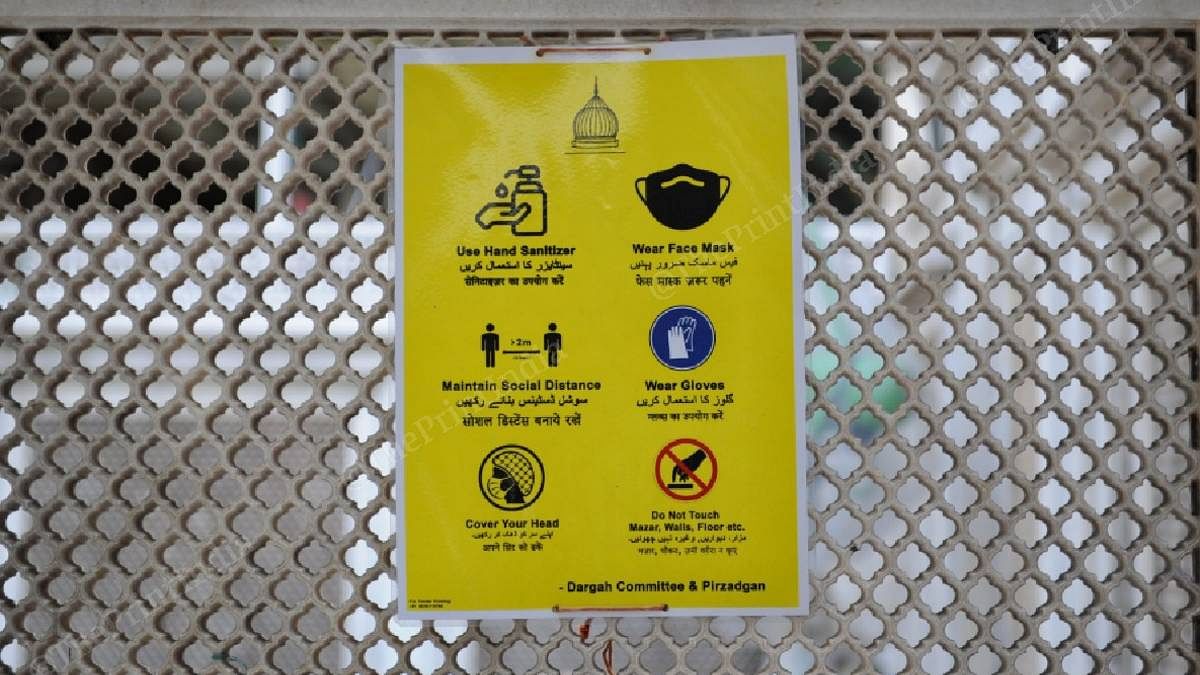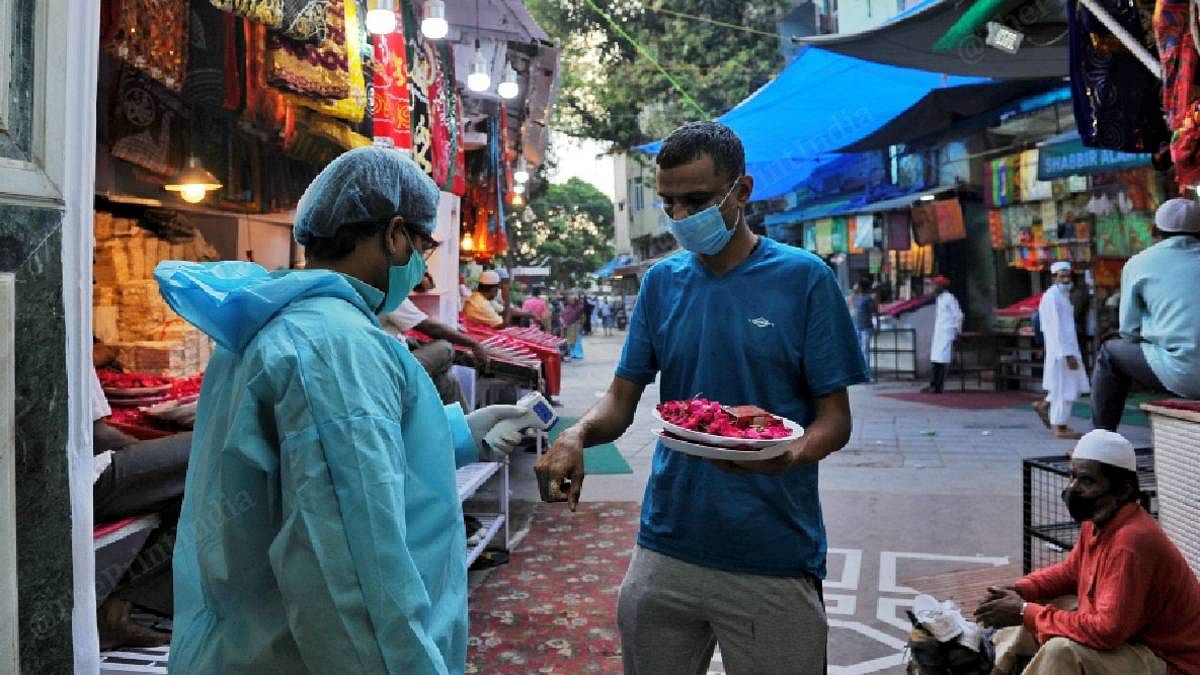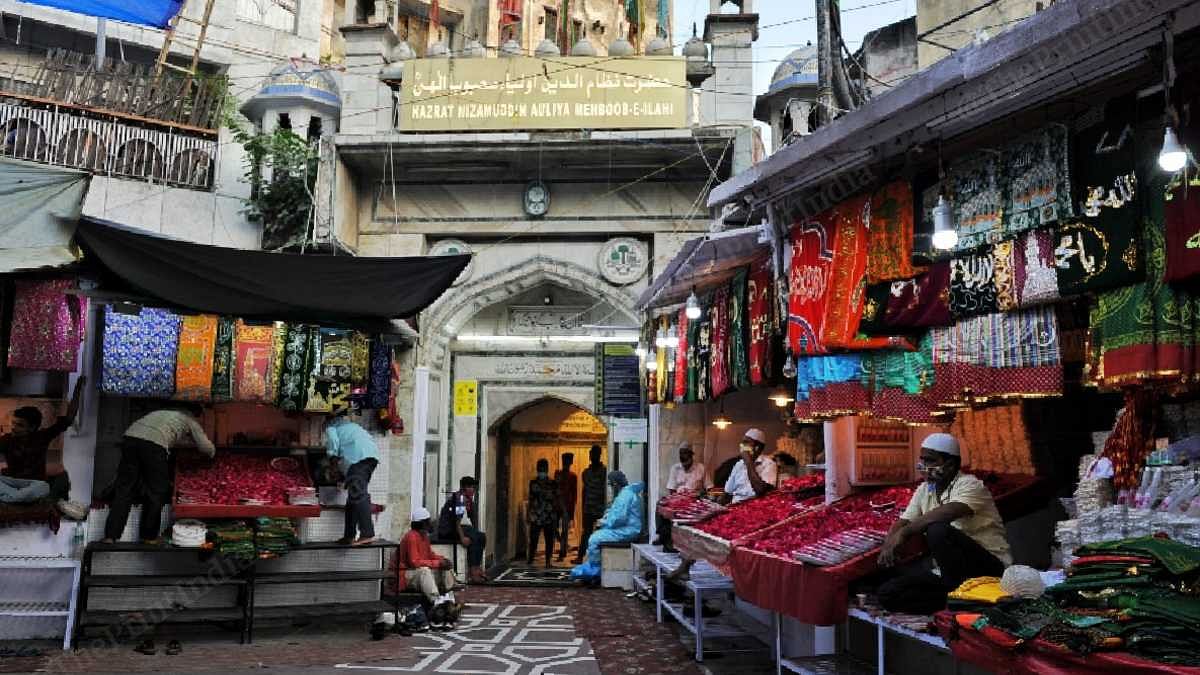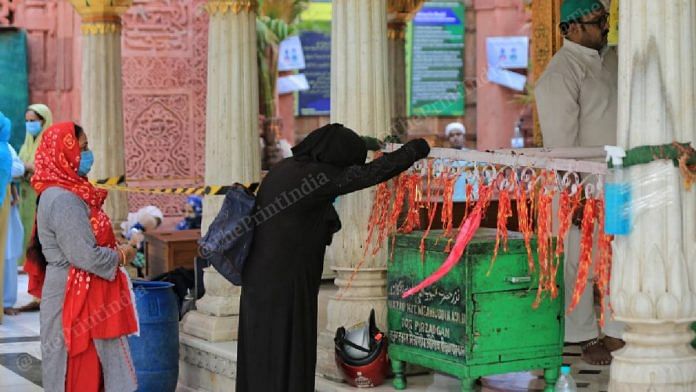New Delhi: Delhi’s Hazrat Nizamuddin Dargah — the revered shrine of Sufi saint Hazrat Nizamuddin Auliya — opened up to devotees earlier this month, but the usually bustling lanes that lead up to it are still missing the lively crowds.
The dargah reopened on 6 September, more than five months since it closed due to the lockdown to curb the spread of the coronavirus, but shops have been struggling to limp back to normalcy.
Named after Sufi saint Hazrat Nizamuddin Auliya, who died in 1325, the dargah and the surrounding basti has developed a rich cultural heritage over the centuries, making it a popular destination for devotees and tourists alike.
However, the pandemic has robbed the complex of its many visitors, and the surrounding shops of their business. Almost all the shops sell flowers and chadars, an offering given by devotees. While earlier the chadar would be placed on the graves inside the complex, they are now put in a designated area away from the graves.
Apart from Hazrat Nizamuddin Auliya’s grave, the complex has the graves of poet Amir Khusrau, the famed poet and disciple the Sufi saint, and princess Jahanara, Mughal emperor Shah Jahan’s daughter.
People who live around the dargah complex, including its committee members, said the gates of the mausoleum had never been shut for this long.
No ‘Wuzu’ or ‘Qawali’
The dargah committee put in place strict social distancing norms and made several changes to protocol to ensure the safety of everyone at the complex.
Before Covid, people would throng the mausoleum, moving in packed serpentine queues to reach the inside of the dargah where the mazar, the graves of the Hazrat Nizamuddin Aulia and Amir Khusro, are.
To one side, a designated washing area would see devotees carry out the Islamic ritual of purification, called Wuzu.
Now, face masks and sanitisers are the norm. The historic walls of the complex have posters listing Covid precautions — ‘use hand sanitisers’, ‘wear face masks’, and ‘don’t touch mazar and walls’. The graves have been covered with plastic sheets so people can’t touch them. Devotees can now only hand over their chadar to assigned committee members, who place them near the graves. The flowers are collected in buckets.

The cleansing ritual of Wuzu has also been discontinued within the complex.
“We don’t allow anyone to enter the area and perform Wuzu because then there is risk of violating social distancing norms. People will also spit … we can’t take any risk. The disease has already consumed so many,” Aleem Nizami, member of the Nizamuddin dargah committee told ThePrint. People are also not allowed to sit near the mausoleum for more than 15 minutes.
People who looked forward to the weekly Qawali night, which was popular among non devotees as well, will have to wait longer. The dargah committee said they might decide on resuming the devotional music performances later, with the required safety protocols, if the government issues revised unlock guidelines.
‘Didn’t want a Tablighi-like controversy’
When other religious institutions across India reopened with Unlock 1.0 guidelines in June, the Nizamuddin Dargah chose to remain shut.
The decision, the management committee said, was predominantly taken as a precautionary measure to avoid the risk of coronavirus infections. But it was also because the committee “feared” a Tablighi Jamaat-like controversy.
The Nizamuddin Dargah is located a stone’s throw from the markaz, the headquarters of the Tablighi Jamaat, a Sunni missionary organisation, at Delhi’s Nizamuddin Basti.
The headquarters was identified as a Covid hotspot after it hosted an event in March that was attended by hundreds of participants, many of whom contracted the virus.
“We didn’t open the dargah that time because preparations had to be made and it was our duty to ensure safety. There is no way we can take the risk of infections. It took us some time to sanitise the dargah completely, order sprays and temperature assessment devices,” Aleem .
“Markaz wale controversy ke baad hume darr bhi laga, aisa kuch fir se na ho jaye bas yahi dua hai. Humne islye sab intezaam hone ke baad, guidelines ko yaad rakhte hue he khola hai (After the Markaz controversy, we were scared and didn’t want a similar incident to happen. Therefore, the dargah was opened only after ensuring all necessary precautions and adherence to guidelines),” said Salmi Nizami, another member of the dargah committee.
Also read: Call it a mistake, not conspiracy against India, say Muslim scholars on Tablighi Jamaat event
Sanitation measures
At the entrance of the dargah, Mohammed Salman checks temperature of devotees walking in and spritzes sanitiser liquid on their hands. Before the pandemic struck, Salman was part of the dargah’s maintenance crew.
Dressed in a PPE suit, the 35-year-old can be seen standing at the entrance of the mausoleum every day from 3pm to 10 pm.

He told ThePrint that he doesn’t allow the entry of people over 60, which are part of the dargah’s new rules. People older than 60 years run a high risk of contracting the virus, along with people who have comorbidities.
“Old people shouldn’t come out like this. They can pray at home. We try to explain to them why they shouldn’t visit,” Salman said.
Shopkeepers suffer economic hit
For the shopkeepers outside the Hazrat Nizamuddin Dargah, the severely reduced footfall has been nearly catastrophic since their businesses took the biggest hit.
Before Covid, the dargah would see thousands of devotees per day, with footfall going up to lakhs on occasions such as Muharram and Shab-e-barat. Now, about 150 people walk by their stores each day.

With no tourists returning any time soon, the situation remains bleak for them.
Mohammed Faruq, who hails from Bihar and has run a flower-chadar shop for over two decades, said, “There is no public here. The percentage of people coming to the dargah is not even 10 per cent of what it used to be earlier. We used to earn Rs 1,000-Rs 5,000 before … now earning even Rs 500 is difficult.”
Also read: Delhi’s Nizamuddin — a bustling blend of history and spirituality, until Covid-19 struck




Dargahs have no sanctity in Islam.Dargahs are nothing more than graveyards of unknown persons.illitrates have coined fake names and magical mystics/stories of those dead persons.Islam is monotheistic Religon and No mediators are allowed in Islam as Allah is close to everyone and He dislikes associates.Many dargahs are having false graves and empty graves,only for the purpose of quick money.How can a person who died long ago and left dust and bones in his grave can be of any help?Illitracy has driven them crazy.